#polidori my dear
Explore tagged Tumblr posts
Text
The Vampyre, by John William Polidori, is two things.
ONE: a love letter to a man Polidori holds in high regards and considers better than all others and thinks is super cool and dreamy smart. Honestly? Polidori is a sad existence, sitting between two couples, trapped in a mansion in a storm, pining over the absolute worst person to pine over. I’m so sorry you fell for Lord Byron, Polidori, may your soul find rest and may you forget all about him.
TWO: the most compelling evidence anyone will ever conjure that Lord Byron is, in fact, himself, a vampire. And we should all really be more worried about those women he was sleeping with, as well as the men he was driving insane.
#the vampyre#john polidori#lord byron#polidori my dear#i feel like an old mother#watching her precious cabbage get snagged by a pig#you have terrible taste my man#but like#i suppose i am not one to judge#on the story#why does aubrey and lord ruthven’s relationship#read so much like a predecessor to both stoker’s dracula#as well as harry potter?#how is it even possible to be so similar to those two properties?#i’m amazed#if i didn’t know any better#i would honestly think this short story was the inspiration for both#and when speaking of harry potter#i mean specifically the relationship between harry and voldemort#it’s wild#the inane ramblings of a madman#also in case anyone was wondering#lord ruthven is an absolute BASTARD and i LOVE him#the end when he finally shows joy???#like come on this man’s insane#i can’t believe polidori’s sexy vampire stand in for his buddy is so enticing#amazing#10/10 polidori
4 notes
·
View notes
Note
I've just seen the post about being visceral horror fan and need to ask: what are your favourite horror titles? 💜 Do you have any recommendations? 💜
Beware, long post below..
This is honestly quite a hard question, and recommendations hinge on what kind of horror one would prefer, and in what medium..! Books, movies, manga, audio tales even! A lot of my personal horror tastes weigh on the side of psychological horror or ones with supernatural or mystic features, less of slashers and violence, though I do enjoy quite a few of such titles as well.. I'll try not to mention all of the most obvious stuff everyone's already seen.
When it comes to games, I always say that if Kingdom Hearts didn't exist my favorite game of all time would be Bloodborne. The gothic style, vague storytelling and existential horror really speak to me. The Project Zero (Fatal Frame in the US) -series is dear to my heart, specifically the third one. The Forbidden Siren -series was also quite a treat in it's time. Honorary meantion to ObsCure, a great game to play with multiple people at a time, but unfortunately I think it's one of the rarest games ever now, so finding a copy/playing it might be quite the challenge..

In literature, I'd recommend getting into classic horror short stories, especially from the eighteen-hundreds! The setting and time they were written in often give them an automatic edge for a spooky tone.. They're fun stuff to read on a moody afternoon, and don't require the bandwidth that a full book might, if you're not such an avid reader. Some suggestions:
The Vampyre, John William Polidori (1819) The Monkey's Paw, W. W. Jacobs (1902) The Room in the Tower, E. F. Benson (1912) Kerfol, Edith Wharton (1912) Afterward, Edith Wharton (1910) The Empty House, Algernon Blackwood (1906) Sir Edmund Orme, Henry James (1891) The Body-Snatcher, Robert Louis Stevenson (1881) The Yellow Wallpaper, Charlotte Perkins Gilman (1892)
With horror movies, I think anyone with an interest in horror already know all the typical classics and modern favorites, so I'd recommend something a tad more obscure.. The asian horror scene, especially in the late 90's and early 2000s was littered with great techno ghost punk flicks. Many of these are favorites from one of my best friends, who really has a taste for this type of movie, but I'll highlight the one's I'm also very into and would especially recommend.
Kaïro / Pulse (2001), Whispering corridors -series, Dark Water (2002), Saiko! The Large Family (2009), A Tale of Two Sisters (2009), Bunshinsaba, The Wailing, The Complex, One Missed Call (2003), Shutter (2004)

This one's probably a very tired answer but with manga I just have to say the obvious, which is Junji Ito. His body of work just really scratches the itch I have for a nice tight scary story and gives a vague uneasy vibe.. Both his storytelling and art is something I love.

One of the main features of horror is suspense, so I would recommend always going in blind, stop with trailers, synopsis etc. and really sit in a dim room on a calm day or evening and get into it! You can only be horrified if you let yourself be.
#ask#answer#my ramblings#horror#realizing that most of my favorite games are ps2 ones#that's all I have time to write right now ha#not kh#not kingdom hearts
35 notes
·
View notes
Text
On November 8th 1820, Claire Clairmont wrote some satirical stories in her journal about Lord Byron and Percy Shelley—they were written as ideas for caricatures (the Regency era term for what we would now call editorial cartoons or comic strips):
Wednesday, November 8th.
Caricature for Albé. He, sitting writing poetry, the words “Oh! faithless Woman” round the room, hearts are strewed, inscribed, “We died for love of you.” Another—he catching a lady by her waist, his face turned towards her, his other hand extended holding a club stick in the act of giving a blow to a man who is escaping. From his mouth,
“The maid I love, the man I hate
I'll kiss her lips and break his Pate.”
Three more to be called Lord Byron's Morning, Noon and Night. The first: he looking at the sky, a sun brightly shining—saying: "Come, I feel quite bold and cheerful—there is no God.”
The second towards evening, a grey tint spread over the face of Nature, the sun behind a cloud—a shower of rain falling—a dinner table in the distance covered with a profusion of dishes, he (with a Wallup) says—“What a change I feel in me after dinner; where we see design we suppose a designer; I'll be a Deist—I am a Deist."
The third—evening—candles just lighted, all dark without the windows (a cup of green tea on the table): and trees agitated much by wind beating against the panes, also thunder and lightning. He says
"God bless me, suppose there should be a God—it is as well to stand in his good graces. I'll say my prayers to-night, and write to Murray to put in a touch concerning the blowing of the last Trump."
Pistols are on the table, also daggers—bullets—Turkish scymitars . . .
Another to be called “Lord Byron's receipt for writing pathetic History.” He sitting drinking spirits, playing with his white mustachios. His mistress, the Fornaria, opposite him drinking coffee. Fumes coming from her mouth, over which is written "garlich;" these, curling, direct themselves towards his English footman who is just then entering the room and he is knocked backward. Lord B. is writing, he says.
"Imprimis, to be a great pathetic poet. First prepare a small colony, then dispatch the Mother, by worrying and cruelty, to her grave; afterwards to neglect and ill-treat the children—to have as many and as dirty mistresses as can be found; from their embraces to catch horrible diseases, thus a tolerable quantity of discontent and remorse being prepared, give it vent on paper, and to remember particularly to rail against learned women. This is my infallible receipt by which I have made so much money."
The last his death. He dead extended on his bed, covered all but his breast, which many wigged doctors are cutting open to find out (as one may be saying) what was the extraordinary disease of which this great man died—His heart laid bare, they find an immense capital “I” grown on its surface—and which has begun to pierce the breast—They are all astonishment. One says, “a new disease.” Another. “I never had a case of this kind before.” A third what medicines would have been proper, the fourth holding up his finger (A desert island.)
Caricature for poor dear S. He looking very sweet and smiling. A little Jesus Christ playing about the room. He says:
“Then grasping a small knife and looking mild
I will quietly murder that little child.”
Another. Himself and God Almighty. He says:
"If you please God Almighty, I had rather be damned with Plato and Lord Bacon than go to Heaven with Paley and Malthus." God Almighty: “It shall be as you please, pray don't stand upon ceremony."
Shelley's three aversions: God Almighty, Lord Chancellor, and didactic Poetry . . .
Sources: The Journals of Claire Clairmont edited by Marion Kingston Stocking, Harvard, 1968, Archive.org. “The Lord Byron / John Polidori relationship and the foundation of the early nineteenth-century literary vampire” by Matthew Beresford, University of Hertfordshire June 2019. Byron: A Biography by Marchand, Vol. II, 1957.
#thus a tolerable quantity of discontent and remorse being prepared#literature#regency#regency era#claire clairmont#percy shelley#lord byron#journals#funny#history#writing#poets#writers#satire#geneva squad#the romantics#romantic age#romanticism#romantic poetry#romantic era
29 notes
·
View notes
Text
WIP: The Gilded Cage, chapter 9
Hi I promise I’m not dead, here’s a sneak peek of the upcoming chapter of The Gilded Cage. Enjoy!
“There you are!”
Bill pounced on Rachel, constricting slender arms around her waist. In this embrace, Rachel truly felt like a fool for avoiding her wife. She’d missed Bill’s affections; missed being held tight and the certainty she was adored above all else.
“You’ve been cooped away for weeks, Fordsy,” Bill chided, “all alone in that musty library! I’m still a superstar as always, but even I get lonely from time to time!”
“Forgive me, my dear,” soothed Rachel. She swallowed down any concerns about nightmares and sleepwalking, and placed a kiss on Bill’s cheek. “I’ve put all my energy into translating those diaries you gave me— I think I’ve found something of great significance! She seemed to have moved on from her development of the philosopher’s stone and began dabbling in the creation of a homunculus—“
“No, no, no, not another word about work,” said Bill playfully. She pressed the small of Rachel’s back, guiding her towards the dining room. “I think I’m finally getting the hang of this cooking thing! I made us dinner; it might even be edible!”
Once they were through the door, they were welcomed by the warm perfume of cooked, well-seasoned meat. Rachel was overwhelmed by just how hungry she was as she took the seat Bill had pulled out for her. A vase of hothouse lilies, vibrant as a bonfire, served as a centerpiece between two cloched dishes; resting at the foot of the vase was a box of chocolates.
“A late Valentine’s gift,” said Bill, “a little treat for after the entrées. Bon appetit!”
Oh how Rachel missed Bill’s company! It felt just as it was back on the train: just the two of them basking in the glow of each other.
Rachel found an unusual meal waiting for her: a dark meat cut into slivers over a bed of greens and sautéed onions.
“Is this game? I don’t recognize this cut of meat,” Rachel asked. Bill winked and tapped her nose.
“Correct as always,” said Bill with a wide smile, one that revealed each shining tooth in her red mouth. “It’s venison— deer heart to be precise! Give it a try!”
Rachel’s own smile faded as a creeping dress began to spread through her body. She had eaten offal before, for years her family’s main protein had been beef liver and tongue. Fee’s own family often served game when she had been over for dinner. However, the chopped remains of the heart only made her think of that terrible nightmare. She never told Bill about it, so of course she couldn’t have known, but all Rachel could see was rivulets of coagulated blood on Bill’s mouth, those pearly teeth shredding Susan’s still-throbbing heart.
Keep it together. Rachel had already scared off Fee, and she was certain Polidori considered her mad. She couldn’t allow herself to lose Bill, her last true companion.
“As for me,” Bill continued, “I was feeling more like poultry, so I tried my hand at Ortolan!” She whipped the cloche off her plate, revealing the pitiful carcass of songbird, plucked and fried in its own fat.
“They say you’re supposed to cover your face when you eat it,” said Bill conspiratorially, “something about hiding your shame from God or whatever? Ha! What a fat load! We’re already eating meat, what does it matter how cruelly it was slaughtered? Well, anyway…”
Bill grabbed the bird by the neck, and Rachel kept her gaze down at her own meal, not wanting to witness what happened next. She knew she would be sick if she watched Bill eat the bird whole. A shame she could still hear the crunch of little bones cracking under teeth.
Rachel picked at her dinner methodically, hoping that if she just cleared her plate, she could excuse herself and retreat back into the library. After finishing the last bite of butter greens and coppery meat, she quickly said “Thank you for dinner—“
“Running off already,” Bill pouted, “come on kid, you haven’t even had dessert yet!” She slid the box of chocolates across the table towards Rachel.
Hesitantly, Rachel opened the box, revealing an assortment of truffles molded into odd shapes. They resembled some of the runes found within the Alchemical diaries: Rachel could spot shooting stars and wide mouthed fish among the assortment, all surrounding Bill’s favorite pyramid symbol.
“They’re bespoke, baby! I had them shipped in from Switzerland!”
“How generous,” said Rachel politely.
“Eat up Sixer,” said Bill, who then stood up from her chair.
“Would you like any,” asked Rachel, confused.
Bill laughed maniacally, shaking her beautiful golden head in dissent.
“Nah, I’ve got a different dessert in mind…”
6 notes
·
View notes
Text
Blas Polidori's Song..

*I like this version better than the original, plz don't fight me*
"What will become of my dear friend?
Where will their actions lead us then?
Although I'd like to join the crowd,
In their enthusiastic cloud,
Try as I may, it doesn't last,
And will we ever end up together?
No, I think not, it's never to become..
For I am not the one.."
♡
11 notes
·
View notes
Note
For the send a fic idea ask:
What are your thought on a Phantom of the Opera vampire AU? 👀
OMG OMG OMG
I do not have the brain to write one, but I WISH I did and I am SO excited to share why.
About two years ago I got into a minor debate about whether "sexy" vampires are a "modern" invention or if there's any basis for it.
Now my standard for "Modern" as far as vampires go is BD and AD ("Before Dracula" and "After Dracula")
So the answer to that was "Yes and No".
No, because "original," vampires of Slavic folklore are mainly zombie-like.
Bram Stoker's classic Gothic novel is largely considered the birth of the modern vampire in pop-culture, and that's TRUE
BUT
He is NOT the first example of the Vampire as a fantastical erotic stalker in media.
Now most people probably do know that Dracula was predated by John Polidori's The Vampyre and Varney the Vampire or the Feast of Blood by several decades.
But the ORIGIN of the erotic vampire predate THEM by more than a century.
Widely considered the first appearance of a vampire in media is the 1748 poem Der Vampire by Heinrich August Ossenfelder. (Read more about that here)
The poem is notable, not only for being the first recorded appearance of a vampire in fiction, but also for its intense erotic subtext.
So how does all this relate to a PotO Vampire AU? Well because when I rediscovered this poem after getting into PotO I discovered in it a few things that connect it, albeit loosely, that connect it to Phantom, some things I think will probably jump out to you as well, including, what I think, is the ideal title for a PotO Vampire AU.
Here is the text of the poem's English translation, which is, like the first translation of Phantom of the Opera, flawed but iconic:
My dear young maiden clingeth Unbending. fast and firm To all the long-held teaching Of a mother ever true; As in vampires unmortal Folk on the Theyse's portal Heyduck-like do believe. But my Christine thou dost dally, And wilt my loving parry Till I myself avenging To a vampire's health a-drinking Him toast in pale tockay. And as softly thou art sleeping To thee shall I come creeping And thy life's blood drain away. And so shalt thou be trembling For thus shall I be kissing And death's threshold thou' it be crossing With fear, in my cold arms. And last shall I thee question Compared to such instruction What are a mother's charms?
If I ever DID work up enough of an actual story to write a PotO Vampire AU, I would, without restraint entitle it "But My Christine, Thou Dost Dally"
But the other section I highlighted you'll notice is the mention of Tockay.
Now Tockay appearing here is not an astonishing thing. It's a sweet Hungarian wine, and as the poem alludes to the Eastern European origins of vampiric lore, the likening of a maiden's blood to this particular wine is not at all shocking.
What does make me smile to myself a bit is the fact that Tockay is also mentioned in both Dracula and The Phantom of the Opera. Its not really a massive bombshell in either of these places either, because Dracula himself serves Jonathan Harker at his castle in Romania, with his tasty roast chicken dinner; and Gaston Leroux has Erik serve Christine a duvet of Chicken with tockay during her stay in his house by the lake.
(Also not too much of a stretch in the case of PotO because Tockay was very in vogue in the early 20th century and only fell out of favour following the Great War when availability became scarce. But Gaston Leroux was a noted admirer of Dracula, and even mentioned Erik reading vampire serials in the original Gaulois serial.)
Tl;dr I have the perfect title for a PotO Vampire Fic
I just don't have the brain to write it.
Yet.
5 notes
·
View notes
Text
Final Project Proposal: Fragility of Memories
One of photography's main goals is to capture and preserve memories. The reason we need to do so is that our own memory is not always reliable and accurate: many experiences are lost to the passing of time, the faces of people dear to us begin to lose detail, and the most vibrant emotions turn duller as we forget. People have always tried to prevent important memories and experiences from getting lost by preserving them visually and capturing the moments through keepsakes, art, and words.
I aim to use light and shadow to juxtapose the themes of forgetting and preserving memories: I hope to use darker and deeper lighting for memories getting lost in the shadows and use softer and brighter lights to accentuate the clarity of preserved memories.
Outcomes:
3-4 images portraying forgotten memories using shadows or blur
3-4 images of clear memories using sunlight or brighter lights to contrast with the photos of forgotten memories
Methods and Materials:
Nikon D40x
Adobe Photoshop 2025
References:
Forgotten Memories by Thomas Vanoost
Chernobyl by Robert Polidori
My Mother's Clothes by Jeannette Montgomery Barron
0 notes
Text
youtube
The demon Faust's Introduction to the Regency/Romantic era AU for this project...
"Perhaps the Dr. Polidori of your world had called Byron a vampire to mock him, but this world’s Polidori wouldn’t be insulting My Lord if he said the same, he’d be merely speaking the truth.
When you’re ready, take my claws in your hands, and I’ll spirit you to my world. Then you can meet Lord Byron yourself and decide whether or not he was a monster."
-V.B. Lavender, Dear Reader: Faust's Introduction, To be The Hunter or The Hunted (via Youtube)
Yes, there's subtitles on my videos too (it's an audio book). That will take some time to update the individual videos (and add the later chapters). But I decided to put this project up, after some debate.
#I'm reposting my old project to my youtube#I need time to subtitle all the videos (and edit the later chapters)#but it will slowly go back up on youtube so my channel isn't dead#Youtube#nanowrimo#writing#writeblr#lord byron#william lamb#caroline lamb#percy bysshe shelley#mary shelley#dr. john polidori#claire claremont#they're all eventually in the story too#regency era#the Romantics#romantic era#regency AU#historic fiction#vampires#demons#vampire hunters#demon slayers#lgbt characters#bisexual characters#mychatter
0 notes
Text
oh dear 😅 I'm not sure thanks is the right word to use here, but thanks for the tag @chaotic-history!
Behold, my Hear-me-out cake:

Denis Diderot - a pretty lousy husband but 1700s no. 1 girldad (maybe along with Aaron Burr). Every source I've read went on and on about how charming he was. His writing's pretty funny. Plus someone I could bitch about Rousseau with. Letters to Sophie are still among the most beautiful ever to be written. Plus relevant grasp of female anatomy confirmed by primary sources. Do you see my vision?
Mark Antony - look, if we take Plutarch's word for it, there's potential. Whatever dynamic they had going on with Cleopatra - the horribly un-Roman one - seems genuinely fun. Plus there's the whole Curio story to keep in mind. I bet he'd look good in a stola.
Gaius Valerius Catullus - sigh, you knew this was coming. Whiny, but by all accounts a great poet. Takes no prisoners with his writing. Plus his daddy's rich.
Camille Desmoulins - he seems to have been really charismatic and I do share a lot of his views? Plus, a talented writer. Plus, I'd trust that Lucile would have had a decent taste.
John Polidori - underrated. A doctor. Has that early 1800s romantic look down. And the sad wet cat energy is all there.
tagging @edwardscissorfeet @trzepotttt @marcusagrippa @theghostofbean @tunathena (no pressure ofc!)
Calling history nerds 🚨🚨🚨
Which historical figure(s) would you put on your hear me put cake?
I would put Thaddeus Kosciuszko and Ulysses S Grant on ofc :) (They can also be someone just for goofiness)
hear me out cake example:
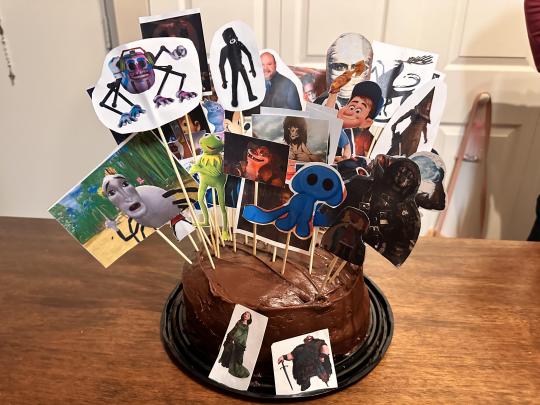
Tag people!!! @allysah @tommy-288 @tompoose @maip--macrothorax @rosemeriwether @pranklinfierce @chaotic-history and everyone else :)
#history#history shitposting#history memes#ask game#reblog game#hear me out#tagamemnon#roman republic#catullus#gaius valerius catullus#mark antony#camille desmoulins#frev#french revolution#john polidori#romanticism#geneva squad#denis diderot#diderot#age of enlightenment
129 notes
·
View notes
Text
Varney the Vampire: Chapter 4
Chapter 3: Blood everywhere; a lightswitch rave.
Chapter 4: Originally posted on Livejournal, December 8, 2010. Revised and expanded from the original recap to talk more about literary vampiring.
CHAPTER IV.
THE MORNING. -- THE CONSULTATION. -- THE FEARFUL SUGGESTION.
No, I didn't skip it—there wasn't any "offer of assistance from Sir Francis Varney" in the previous chapter. Not even so much as an apologetic plate of cookies left on the garden wall. Was there any revision involved in writing this, or did James Malcolm Rymer just... put the pen to the paper and wait for the check? Not that I don't feel you, my guy, but "I'm just gonna seat-of-my-pants 667,000 words" is a terrifying prospect (I had thought he'd at least write each chapter once and then revise it to be worse). I'm pretty sure I've put more revision into this blog post, for free. Side note, my man James Malcolm:
What wonderfully different impressions and feelings, with regard to the same circumstances, come across the mind in the broad, clear, and beautiful light of day to what haunt the imagination, and often render the judgment almost incapable of action, when the heavy shadow of night is upon all things. There must be a downright physical reason for this effect -- it is so remarkable and so universal. It seems that the sun's rays so completely alter and modify the constitution of the atmosphere, that it produces, as we inhale it, a wonderfully different effect upon the nerves of the human subject. We can account for this phenomenon in no other way. Perhaps never in his life had he, Henry Bannerworth, felt so strongly this transition of feeling as he now felt it, when the beautiful daylight gradually dawned upon him, as he kept his lonely watch by the bedside of his slumbering sister.
Bram Stoker:
No man knows till he has suffered from the night how sweet and dear to his heart and eye the morning can be. When the sun grew so high this morning that it struck the top of the great gateway opposite my window, the high spot which it touched seemed to me as if the dove from the ark had lighted there. My fear fell from me as if it had been a vaporous garment which dissolved in the warmth.
I'm not pointing this out to say that Stoker did or did not Steal Like An Artist from, perhaps, a collected serial he read in his boyhood, and then wrote it better. Honestly, if he did? Good for him. I'm pointing this out to say, I only have one short life to live, and for some reason, I decided to spend it reading this.
So. In the light of day, Henry finally looks over at the spooky portrait and thinks to himself, you know, that right there is a Spooky Portrait and it gives me a scare:
He tried to keep himself from looking at it, but he found it vain, so he adopted what, perhaps, was certainly the wisest, best plan, namely, to look at it continually.
I don't know why this makes me laugh so much. Sure, that's a plan. And, Henry notes, it's even one of those paintings where the eyes follow you around the room. Maybe we should, you know, take it down. And then he goes, eh. It's a rare work of art, it's painted onto the panel and we'd have to call a contractor out here, we were out all night watching that vampyre fall on his ass, I'm kind of tired, whatevs.
Meanwhile, Flora is still (quite reasonably) traumatized: "My brain is on fire! A million of strange eyes seem to be gazing on me." Like, I'm not actually trying to compare this sentence by sentence (god forbid) to Dracula, but I know it well enough that I remember Jonathan using the same "brain on fire" wording—how common an expression was this? I even went back to check Polidori's "The Vampyre"—"his thoughts were bursting from his brain," an oddly specific throughline of brain-centric disturbance. Just Vampyre Things, I guess.
Despite having chased the vampyre to his own garden wall, Henry is utterly baffled as to why Flora would be so upset—physically weakened, even! She was fine yesterday! What, oh what, could have happened??, he inquires of Mr. Marchdale. Henry is probably saying this while a housekeeper bustles past with a huge bundle of blood-soaked sheets. What do we think was in Flora's room, even though we all saw it gnawing on her throat and we're pretty sure what it was? I mean, we just saw someone making a hideous repast of her, I am completely baffled. But wait! says Marchdale. I've thought of an answer! Now—hold on for this— (I'm holding on—) Because this is gonna blow your mind— (Okay, keep going—) Are you ready for this? (I'm totally ready for this—) I think it was—I can hardly bring myself to say the word aloud and will continue not to say it for another 100 words— (SAY IT GODDAMMIT—) A VAMPYRE!
Well, why do you think this?
"... my pistol bullets hurt him not; and he has left the tokens of his presence on the neck of Flora." "Peace, oh! peace. Do not, I pray you, accumulate reasons why I should receive such a dismal, awful superstition. Oh, do not, Marchdale, as you love me!" "You know my attachment to you," said Marchdale, "is sincere; and yet, Heaven help us!" His voice was broken by grief as he spoke, and he turned aside his head to hide the bursting tears that would, despite all his efforts, show themselves in his eyes.
For shame, Henry, you made your mom's... someone... cry! (Don't get me wrong, I love Weepy Masculinity, and we'll talk about it more another time.) But Henry is shocked, I tell you, shocked! that Marchdale should come to such a conclusion! To believe would drive him mad, I tell you! MAAAAAAAAD!
And then George comes in all like, "Guys, I know this is gonna sound crazy, but—hold on for this—I think it was a—" "VAMPYRE, WE KNOW." And now George the "frail reed" is crying, Henry, see what you've done?
Unfortunately, Henry is pretty much the only person in a hundred-mile radius who is having trouble with this concept; the servants, we are told, immediately ran out and told everyone about the vampyre flumping over the garden wall. Henry rides into town to fetch a doctor and immediately runs into Some Gentleguy on Horseback. "Bro, what's this about your sister getting bit by a vampyre?" "Uh... no. That was... a thief. That was totally a thief." "No? Seriously, the whole town's talking about it. You sure? Like fang marks and everything—" "MAAAAAD, I TELL YOUUUUU!!"
At last Henry gets to the doctor—who starts out as "Mr. Chillingworth" and mysteriously becomes "Dr. Chillingworth" some five hundred pages from now. (In fairness, many doctors, particularly surgeons, were merely "Mister" long into the nineteenth century. Side note: The Scarlet Letter would not be published until 1850, and on a different continent at that. I checked, because I immediately thought the name was an allusion.) So Mr. Dr. Chillingworth listens to Henry's story, and I'm getting all clappy because this has got to be our Van Helsing figure, and I have always loved the Kindly Old Doctor Who Knows All the Legends type, and so Henry finishes and Chillingworth declares—
"I don't care if [the facts] were ten times more glaring, I won't believe it. I would rather believe you were all mad, the whole family of you -- that at the full of the moon you all were a little cracked."
(*record needle scratch*)
Well, Stoker certainly didn't run off with that.
So Henry gets back to Bannerworth Hall and he starts telling Flora that it was totally a thief who was chewing on her throat. Totally. But he'll just keep sitting by her bedside. You know. Just in case more thieving is a-fang.
"Then I shall rest in peace, for I know that the dreadful vampyre cannot come to me when you are by." "The what, Flora?" "The vampyre, Henry. It was a vampyre." "Good God, who told you so?"
She was… there? The holes in her neck? Keep up? Maybe Henry has that Memento thing where he can't remember anything for longer than five minutes, which���well, that would explain a lot about the writing style, actually. Flora replies,
"No one. I have read of them in the book of travels in Norway, which Mr. Marchdale lent us all."
So--a møøse bit his sister?
"They do say, too, that those who in life have been bled by a vampyre, become themselves vampyres, and have the same horrible taste for blood as those before them. Is it not horrible?"
For those of you keeping score, in-story popular belief at this point is that it takes only one bite to turn you into a vampire. This is contradicted later, because of course it is, but it's worth noting; it fits with the idea that the less sexually permissive a society/era is, the more easily you get punished by the contagion. You'd think, then, that this bodes ill for Flora, but as far as I know, either Flora has a Purity Override, or fuck continuity, that's what.
Enter Mr. Dr. Chillingworth, who wants to know about Flora's "dream." "It wasn't a dream, it was a vampyre!" "Is that what you call a dream?" NO, IT'S WHAT I CALL A VAMPYRE. She shows him the bites on her neck, and he's all, pshhhh, those, those are totally insect bites. You know, giant seven-foot insects with scratchy fingernails and hypnotic tin eyes. Bit of Raid's all you need, take care of that in a jiff.
Chillingworth and Henry say nothing in particular for 300 words, at the end of which Chillingworth finally declares that vampyres are "a degrading superstition," and that Flora seems to be "labouring under the effect of some narcotic." You know, those narcotics you staple into people's necks, leaving two (2) holes. Or: blood loss, but that's far less likely, in his medical opinion, so he's just confused now.
"You have, of course, heard something," said Henry to the doctor, as he was pulling on his gloves, "about vampyres."
"I certainly have, and I understand that in some countries, particularly Norway and Sweden, the superstition is a very common one."
And he thinks Let the Right One In was much better than the remake.
WHAT ARE YOU EVEN TALKING ABOUT?
I don't know why I didn't mention this in 2010, but I'm guessing Henry is referring to the Old Norse draugr—like, I know there are Scandinavian vampires, it's just that... I've never seen English-language vampire literature of the 1800s mention them? LeFanu mentions "Upper and Lower Styria, in Moravia, Silesia, in Turkish Serbia, in Poland, even in Russia" in "Carmilla" (1872), and Andrew Lang wasn't talking about draugr until late 1897, "with the idea further pursued by more modern commentators." Polidori's "Ruthven" is a Scottish name, and its bearer goes vampiring in Greece, for that matter. In fact, when Henry chimes in, "And in the Levant," Rymer may be alluding to Polidori. But he just throws "Norwegian vampires" in like, well, obviously. What, haven't you read Grettis saga Ásmundarsonar, published in English, uh, twenty years from now?
However Rymer came by this, whatever travelogue he did read, the draugr doesn't seem to have caught on quite the way Dracula, or even Ruthven, did. Who knows, maybe "Transylvanian vampires" sounded equally random in 1897, but that's the lore that won pop culture.
Mr. Dr. Chillingworth also mentions "the ghouls of the Mahometans." The word "ghoul" comes directly from the Arabic word ghūl, which is "associated with graveyards and the consumption of human flesh," although the concept seems to be pre-Islamic Arabian, not specifically "Mahometan" (i.e., Mohammedan, an archaic or even offensive term; TIL). Rymer would have known the word from the influential 1786 Gothic-Orientalist novel Vathek, and may have even used it here as a specific callback, because it would be a shame to just go on and have a vampyre without blaming it on Those Foreigners. Chillingworth continues,
"All that I have heard of the European vampyre has made it a being which can be killed, but is restored to life again by the rays of a full moon falling on the body."
Here we go. It's worth noting here (no, I swear it is) that the idea of sunlight instantly killing vampires is a complete invention of the German film Nosferatu (1922), an "unauthorized adaptation" of Dracula. I love bringing this up as often as possible, because Dracula being slain by a convenient blast of light (Horror of Dracula, 1958, reporting for duty) is such a deeply ingrained pop-culture thing, and it is 10,000% not in the original novel. Which all you Dracula Daily regulars know, I'm sure. Stoker plays as loose with his Vampire Rules as Rymer does, but Dracula does appear in daylight at least twice that I can remember off the top of my head, although it's said to weaken him. I feel like the functional point of this is to have Any Time At All When The Heroes Have A Shot In Hell At Not Getting Eaten, and so this is why the literary vampire of the 1800s sometimes has to scamper off to its coffin at the stroke of dawn. Carmilla has to do this, but she also strolls back to Laura's house at... one in the afternoon; clearly, sunlight is not terribly crucial to the lore. Rather, it's moonlight that's associated with vampires earlier in the century—as a means of reviving them. It's actually a key plot point in Polidori's "The Vampyre" (back in 1819), and one of the stand-out elements in the popular awareness of vampires at the time.
Oh! By the way, tonight happens to be the night of the full moon. Even Chillingworth says, "If now you had succeeded in killing —. Pshaw, what am I saying."
"To-night," [Henry] repeated, "is the full of the moon. How strange that this dreadful adventure should have taken place just the night before."
Indeed. And the serial really wants us to notice this. You'd think a vampyre might avoid a bright night when they'd be more likely to be seen, but, on the other hand, maybe that's Moon Insurance in case they get capped on someone's garden wall. To confirm, Henry gets Travels in Norway off the bookshelf, and—after a thorough, paid-by-the-word description of how books sometimes open at certain pages, right down to the way the binding gets stretched—
"With regard to these vampyres, it is believed by those who are inclined to give credence to so dreadful a superstition, that they always endeavour to make their feast of blood, for the revival of their bodily powers, on some evening immediately preceding a full moon, because if any accident befall them, such as being shot, or otherwise killed or wounded, they can recover by lying down somewhere where the full moon's rays will fall on them."
There it is. Since we're going chapter by chapter, it's easy to lose sight of the big picture, but what I think the serial is getting at is, Varney probably is "dead" somewhere on the heathy landscape after getting his hapless ass shot. Except—EXCEPT! for the moonlight that just so happens to be in place to revive him. Because, while the FULL MOON. IT'S A FULL MOON might seem kind of randomly gothic to us, everyone reading this in 1847 would have been chortling in anticipation.
(Chapter 5 will go up on Friday, March 24.)
65 notes
·
View notes
Photo

Good evening, dear colleagues!
I am Happy to say that I am now in possession of Polls, and inspired by my Delightful colleague @fol-de-lol‘s Advent Trivia Questions, I am Proud to Announce:
THE GREAT JOHN-OFF OF ENGLISH MAGIC
38 Johns, Jonathons, Johnsons &c. from both Jonathan Strange and Mr Norrell and The Ladies of Grace Adieu will, over the next few days, battle it out to become The Ultimate John!
The brackets were chosen by a mixture of random number generator and personal choice on my part to make the different rounds as interesting as possible.
This post will link to all active polls, once they are posted.
ROUND ONE MATCHES: Preliminaries
Match 1: Sir John Sowreston vs Jonathan Barratt 56%:44%
Match 2: John Ker, 3rd Duke of Roxburghe vs Captain John Kincaid 54%:46%
Match 3: John Waterbury, Lord Portishead vs John Brassfoot 76%:24%
Match 4: John Ford vs Jonah Montefiore DRAW! REMATCH!
Match 5: Jeremy Johns vs John Longridge 87%:13%
Match 6: John Aubrey vs Rev John McKenzie 88%:12%
ROUND TWO MATCHES
Bracket 1
John Hyde vs [Sir John Sowreston or Jonathan Barratt]
John McKean vs Johnson (Beggar)
John Copperhead vs John Alfreton
Jonathan Strange vs John (Waiter)
Bracket 2
John Napier vs [John Ker, 3rd Duke of Roxburghe or Captain John Kincaid]
John Windle vs John Harker
John Segundus vs John Upchurch
[John Waterbury, Lord Portishead or John Brassfoot] vs Black Joan
Bracket 3
John Childermass vs [John Ford or Jonah Montefiore]
Dr John Willis vs John (Servant)
John Hollyshoes vs Clara Johnson
John d’Uskglass vs John Cockcroft
Bracket 4
John Uskglass vs [Jeremy Johns or John Longridge]
John Wheston vs Captain John Ayrton
John Polidori vs John Purvis
[John Aubrey or Rev John McKenzie] vs John Murray
ROUND THREE MATCHES
TBC
QUARTER FINALS
TBC
SEMI FINALS
TBC
THE FINAL JOHN-OFF
TBC
60 notes
·
View notes
Text
Byron and Shelley chronicle their 1816 sailing trip in Lake Geneva — Days 6/7, June 28th/29th — preview: they get stuck in Ouchy due to the rain, go sightseeing in Lausanne, and visit Edward Gibbon’s former home.
Percy Shelley, History of a Six Weeks' Tour:
“The rain detained us two days at Ouchy. We however visited Lausanne, and saw Gibbon's house. We were shewn the decayed summer-house where he finished his History, and the old acacias on the terrace, from which he saw Mont Blanc, after having written the last sentence. There is something grand and even touching in the regret which he expresses at the completion of his task. It was conceived amid the ruins of the Capitol. The sudden departure of his cherished and accustomed toil must have left him, like the death of a dear friend, sad and solitary.
My companion gathered some acacia leaves to preserve in remembrance of him. I refrained from doing so, fearing to outrage the greater and more sacred name of Rousseau; the contemplation of whose imperishable creations had left no vacancy in my heart for mortal things. Gibbon had a cold and unimpassioned spirit. I never felt more inclination to rail at the prejudices which cling to such a thing, than now that Julie and Clarens, Lausanne and the Roman Empire, compelled me to a contrast between Rousseau and Gibbon.
When we returned, in the only interval of sunshine during the day, I walked on the pier which the lake was lashing with its waves. A rainbow spanned the lake, or rather rested one extremity of its arch upon the water, and the other at the foot of the mountains of Savoy. Some white houses, I know not if they were those of Mellerie, shone through the yellow fire.”
Byron in a letter to John Murray:
“Ouchy, near Lausanne, June 27th, 1816.
Dear Sir
I am thus far kept by stress of weather on my way back to Diodati near Geneva from a voyage in my boat round the lake - & I enclose you a sprig of Gibbon's Acacia & some rose leaves from his garden - which part of his house I have just seen - you will find honourable mention in his life made of this ‘Acacia’ when he walked out on the night of concluding his history. - The garden - & summerhouse where he composed are neglected - & the last utterly decayed - but they still show it as his ‘Cabinet’ & seem perfectly aware of his memory. - My route - through Flanders - & by the Rhine to Switzerland was all I expected & more. - -
I have traversed all Rousseau's ground - with the Heloise before me - & am struck to a degree with the force & accuracy of his descriptions - & the beauty of their reality: - Meillerie - Clarens - & Vevey - & the Chateau de Chillon are places of which I shall say little - because all I could say must fall short of the impressions they stamp.
Three days ago - we were most nearly wrecked in a Squall off Meillerie - & driven to shore — I ran no risk being so near the rocks and a good swimmer - but our party were wet - & incommoded a good deal: - the wind was strong enough to blow down some trees as we found at landing - however all is righted & right - & we are thus far on return.
Dr. Polidori is not here - - but at Diodati - left behind in hospital with a sprained ancle acquired in tumbling from a wall - he can't jump.* ——“
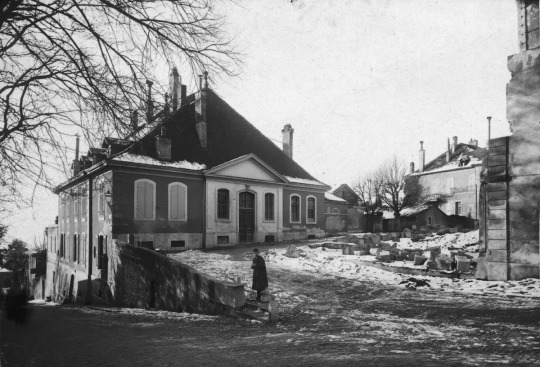

*This is a reference to the instance where Byron (probably jokingly) suggested that Polidori should jump off a balcony in the rain to impress Mary Shelley. When Polidori actually did it, Byron was shocked and helped him inside to prop him up with a pillow. Polidori was then furious with him. See: Mary Shelley’s contributions concerning the Villa Diodati in Thomas Moore’s Life of Byron
UPDATE: I took my dates from Shelley, but his dates must have been confused and Byron's must be more accurate. Because I'd been confused by Byron's dates in the past, since he often wrote past midnight (thus often referring his prior day as "today"), I had assumed Shelley was more trustworthy. According to Shelley and His Circle vol. 4 pp. 700-701, they left on June 22nd which was a Saturday, and so I believe each day of their trip would be one earlier than I and Shelley stated in these posts.
Taken from Shelley and His Circle:
"TIMETABLE OF THE LAKE GENEVA TOUR
June 22, Saturday: Sailed from Montalègre, slept at Nernier.
June 23, Sunday: Sailed from Nernier, slept at Evian.
June 24, Monday: Sailed from Evian, encountered storm off Meillerie, slept at St. Gingolph.
June 25, Tuesday: Sailed from St. Gingolph, saw the mouths of the Rhone, visited Chillon Castle, landed at Clarens, visited bosquet de Julie, slept at Mme. Pauly's house (Place Gambetta) at Clarens.
June 26, Wednesday: Visited Le Châtelard, and the bosquet de Julie, sailed from Clarens, visited Vevey, slept at the Hotel de l'Ancre at Ouchy.
June 27, Thursday: Visited Gibbon's house at Lausanne, slept at Ouchy.
June 28, Friday: Remained at Ouchy.
June 29, Saturday: Sailed from Ouchy, slept at [?Rolle].
June 30, Sunday: Sailed from [?Rolle], arrived at Montalègre."
#shelley and byron’s sailing trip#poetry#english literature#literature#lord byron#romanticism#history#writing#percy shelley#geneva#geneva squad#aesthetic#romantics#romantic poets#travel writing#switzerland#sailing#trip#trip diary#diaries#letters#books
13 notes
·
View notes
Text

Terrible Geneva Squad meme that I’m sure has been done before
Also I am forever haunted by what happened when I sent my dear dear friend pictures of Byron and Polidori
107 notes
·
View notes
Text
Dear Dracula Daily people,
You should read The Vampyr by John William Polidori. It was written by Lord Byron's physician at the same gathering that Frankenstein was written. Also read Carmilla. Varney the vampire from penny dreadfuls is questionable, in my opinion, though.
Signed,
A 19th century vampire lit nerd
28 notes
·
View notes
Note
I believe with my whole chest that Eddie Munson would prly love reading vampire books if he enjoyed reading older literature
Like I'm not even talking just Stoker's Dracula. I'm talking Polidori, Carmilla, Varney the Vampire, and he would also love Interview With The Vampire (ik it wasn't published until the 90s but I still think he'd love it).
And then this makes me think of Modern!Eddie devouring vampire media, although maybe not Twilight bc those books and films are v poorly written (we'll pretend that I'm not studying them for uni next year). Like I definitely think he'd watch Buffy and enjoy it. He'd have all the boxsets and get you to watch them with him bc vampires are v cool and v metal.
Also he'd have a Lost Boys poster in his room, you can't change my mind
- 💀🦄
ahhhhh please the literature major in me is going nuts over this!!! especially bc I specialised in horror literature (granted I specialised in ‘modern’ horror so I’m talking from the 80s onwards specifically )
but anyways I bet that’s exactly the kind of stuff Eddie would love, like he doesn’t read books too often but when he does it’s something horror / gothic related, and he loves horror films, especially those wonderful cheesy horrors of the 80s
like just imagine dates to the cinema with him to watch the latest horror movie and the two of you clutching onto each other for dear life lmao
and you’re right absolutely he’d be into vampire stuff, I just think he’d be into any and all kind of fantasy and supernatural literature and films
please he’s really just a man after my own heart
- hope
11 notes
·
View notes
Text
ok this took way longer than i expected because i got sidetracked looking at paintings and reading poetry and just admiring the mv, but it's finally finished!! let's talk about
higher
✨
i'm going to draw your attention to a few things.
firstly, these verses from rime of the ancient mariner by samuel taylor coleridge, published 1834:
The harbour-bay was clear as glass,
So smoothly it was strewn!
And on the bay the moonlight lay,
And the shadow of the Moon.
The rock shone bright, the kirk no less,
That stands above the rock:
The moonlight steeped in silentness
The steady weathercock.
And the bay was white with silent light,
Till rising from the same,
Full many shapes, that shadows were,
In crimson colours came.
A little distance from the prow
Those crimson shadows were:
I turned my eyes upon the deck—
Oh, Christ! what saw I there!
Each corse lay flat, lifeless and flat,
And, by the holy rood!
A man all light, a seraph-man,
On every corse there stood.
This seraph-band, each waved his hand:
It was a heavenly sight!
They stood as signals to the land,
Each one a lovely light;
This seraph-band, each waved his hand,
No voice did they impart—
No voice; but oh! the silence sank
Like music on my heart.
secondly, this ivan aivazovsky painting, chaos (the creation), c. 1841:
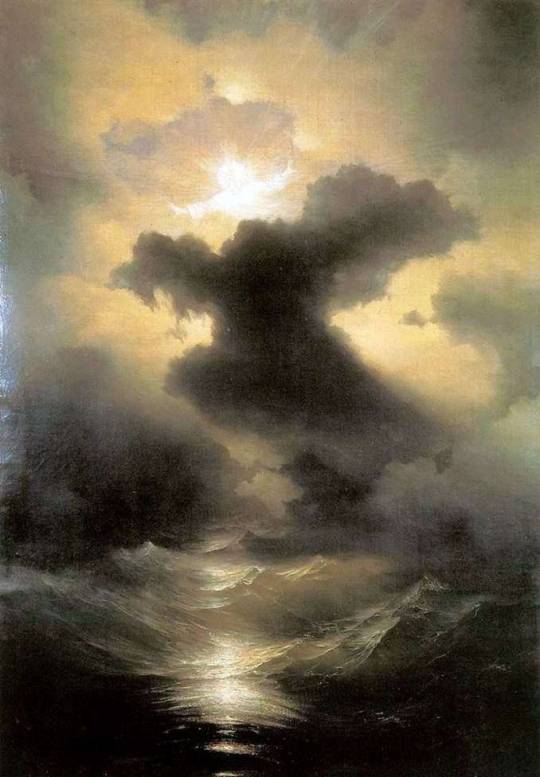
and thirdly, the memorial of percy shelley, who drowned in a boating accident at age 29, in 1822:
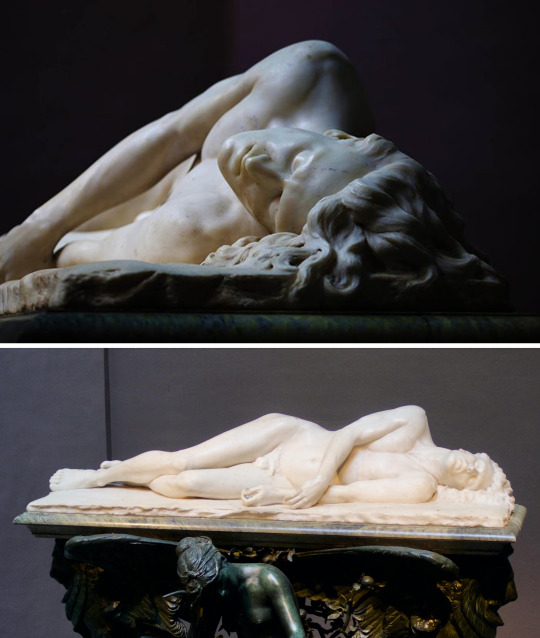
there's a common conflation between the romantic and the pastoral in the general cultural consensus because the pastoral a) has been around as an art term longer than romantic, and b) romanticism does use some similar imagery. but there is a key difference: the pastoral is specfically an idealization of 'the simple shepherding life,' often for high class and urban audiences who have no conception of the details of this life includes. one of the more famous examples is christopher marlowe's a passionate shepherd to his love, published in 1599:
Come live with me and be my love,
And we will all the pleasures prove,
That Valleys, groves, hills, and fields,
Woods, or steepy mountain yields.
And we will sit upon the Rocks,
Seeing the Shepherds feed their flocks,
By shallow Rivers to whose falls
Melodious birds sing Madrigals.
And I will make thee beds of Roses
And a thousand fragrant posies,
A cap of flowers, and a kirtle
Embroidered all with leaves of Myrtle;
A gown made of the finest wool
Which from our pretty Lambs we pull;
Fair lined slippers for the cold,
With buckles of the purest gold;
A belt of straw and Ivy buds,
With Coral clasps and Amber studs:
And if these pleasures may thee move,
Come live with me, and be my love.
The Shepherds’ Swains shall dance and sing
For thy delight each May-morning:
If these delights thy mind may move,
Then live with me, and be my love.
whereas romanticism is a more pointedly specific movement that was active from around 1800 to 1850, primarily focused on intense emotion and catharsis as the primary experiential output of an artwork. which most prominently manifested in a deep fascination and glorification of the natural environment and historical nostalgia. the movement sprung from the german sturm und drang (literally storm and drive/stress) period of the late 1760s to early 1780s, which was a direct reaction to rationalism and enlightenment. romanticism had similar impulses; it was also a revival of medievalism and a reaction against the looming urban sprawl and mechanization of the industrial revolution. a typical romantic poem from one of the originators of the english movment william wordsworth, composed upon westminster bridge, september 3, 1802, originally published 1807:
Earth has not any thing to show more fair:
Dull would he be of soul who could pass by
A sight so touching in its majesty:
This City now doth, like a garment, wear
The beauty of the morning; silent, bare,
Ships, towers, domes, theatres, and temples lie
Open unto the fields, and to the sky;
All bright and glittering in the smokeless air.
Never did sun more beautifully steep
In his first splendour, valley, rock, or hill;
Ne'er saw I, never felt, a calm so deep!
The river glideth at his own sweet will:
Dear God! the very houses seem asleep;
And all that mighty heart is lying still!
this romantic fascination with nature was underpinned by the philosophy of the sublime, generally agreed to be first treatised by edmund burke in 1756, the theory was also written about by kant and hegel. in the simplest of terms, the sublime is a quality of greatness beyond calculation, imitation, and human comprehension. the sublime is twofold; the greatness of the ocean is beautiful, but its power is also terrifying, and the experience of the sublime is to feel those two at once. to be in awe and also to be horrified of its ability to sink ships and drown a life in a tempermental change of tide.
let's take a quick detour to talk about
clothing
in the present day we have become much more lax thanks to the aesthetic movement in the late nineteenth century, but back in the early victorian period there are still highly structured rules about when and what clothing one can wear in public. and the clothing itself is also highly structured. anyone with a passing understanding of the victorian era knows about the whole flashing of the ankle thing and corsets galore, and it is true that the general day to day garments cover a lot of area. for men in particular, this manifests in no less than three layers in public at all times: shirt, waistcoat, and suit jacket, with a coat or mantle overtop in colder temperatures. this also includes a variation of a neck tie (depending on what year), hat, gloves, and any other decided upon accessories (this can also include a corset and other padded structural underpinnings). an important tangent to mention here is that this is the uniform of the upper classes, although the rules do apply to the lower classes if they wanted to appear 'sophisticated.' the working man's uniform was also shirt, waistcoat, trousers, but the difference here is in the textiles themselves; the colours tended to be much more drab, with less complicated patterns. obviously due to the price fabric itself, but also due to the labour of laundry. an indicator of class here is the white shirt itself and its pristine implications. (there is a longer conversation here about the invention of neckties and detachable collars and cuffs, but that's for another day). the silhouettes are very important to note here in the higher mv, as they are directly referential to the 'romantic poet' archetype of loose shirt and tight pants that we see in popular culture. but as i've just said, the reality is that men of the era were not dressed like this out in public. this look is essentially underwear; the implications are salacious. so where did this come from? well, we can blame it mostly on lord byron, who by all accounts was the first western 'rockstar.' notoriously called 'mad, bad and dangerous to know' by lady caroline lamb (a married women he publically had an affair with), byron was openly bisexual and deeply hedonistic with a lot of questionable habits, but his poetry was so popular that he was known to have women following him in the street and gathering in large quanities to see him at salons. and this was close to three decades before lizstomania. his close friends and contemporaries included percy and mary shelley, with whom he lived with abroad in italy for some time (this living arrangement resulted in the writing of both frankenstein and john polidori's the vampyre). byron's reputation was so eclipsing that the image of the lush poet lazing in his undergarments has become its own genre of romantic, slightly removed from the movement byron was writing in. it's also worth it to point out that there are no official portraits of byron dressed like this from the time. the visual assumption is somewhat apochryphal. now let's get into some specifics. a.c.e is not unfamiliar to this silhouette; as previously mentioned in this post i wrote about their styling, the boxy loose upper and fitted lower is their general mode for their styling because of its emphasis on legs. cactus was the most extreme example of this, and to prove my point, this specific silhouette is extremely common in classical ballet:
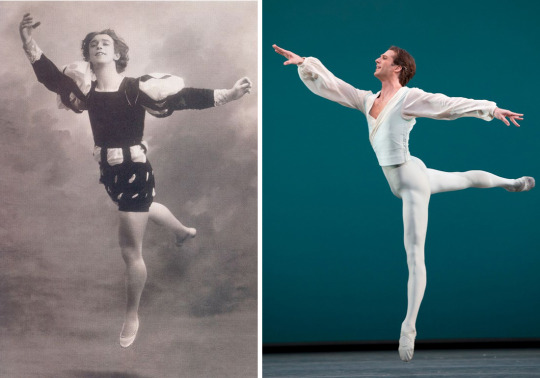
1. vaslav nijinsky, giselle, 1911 2. nehemiah kish, george balanchine's ballo della regina, 2011/12
higher fits very neatly into this same category: we have an emphasis on the legs through tightly fitted garments and also through light reflective textile, as well as a secondary emphasis on arm and shoulder movements with looser fit shirts. plus, the shirts are made from fabrics that have good drape and flow, and mimic the visual effects of water:

there are also several instances of scale patterning and wetlook hair styles, further elabourating on the siren theme. and the jewelry is the same, purposefully cut clear stones for oceanic sparkle or pearls, the gem directly born from water, as highlighting accents to specific parts of the body - namely eyes, hands, and torso:

the body jewelry also serves a double purpose in addition to being sparkly; it gives a semblance of shape to their torsos so their movements aren't totally lost in the shroud of their shirts, and it also invokes some of that salacious element that us as a modern audience doesn't necessarily perceive in the same way when we see a man wearing only a shirt. all of these points are especially prominent in the stage costuming. concerning the veils, these are an aesthetic choice following the theme of depicting water without actually using water. the song has a very breathless quality to it, and the lyrics directly make reference to water and breathlessness, so it only makes sense to have a physical manifestation of struggling to breathe.
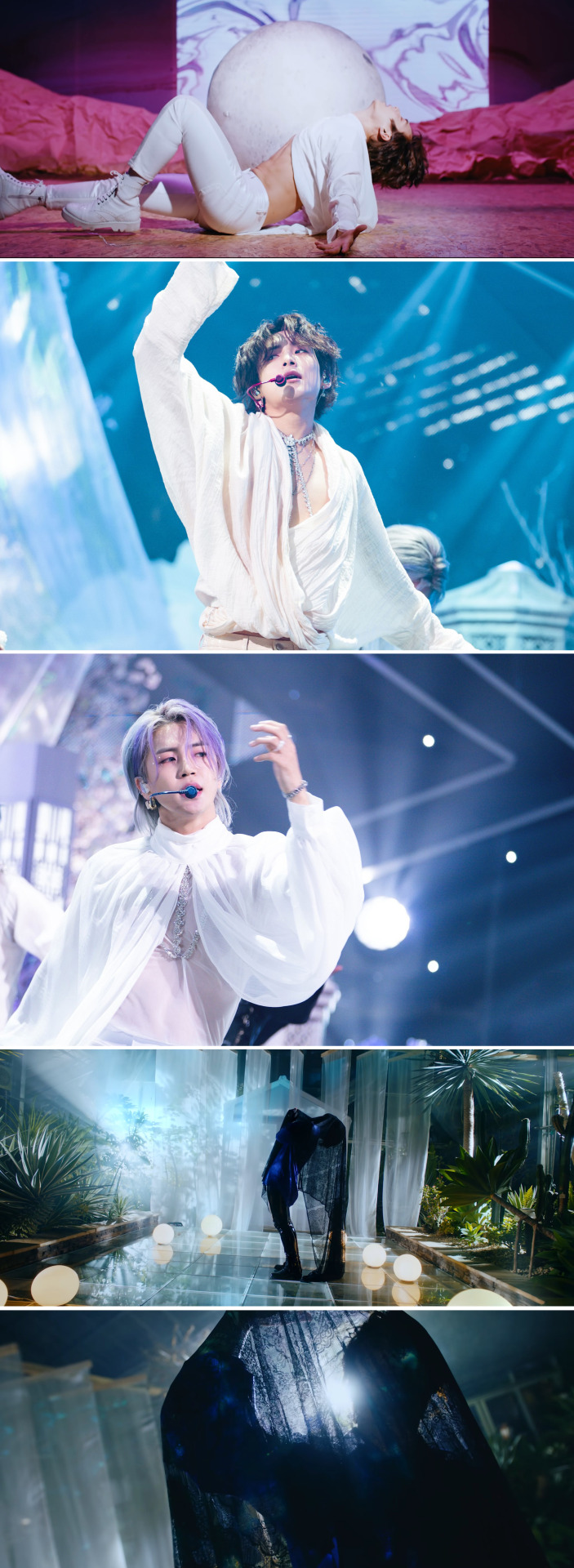
now let's talk about
mise-en-scène
unlike most kpop mvs, I would argue that higher is not a spectacle in what we normally see spectacle to be. the overwhelming visual saturation of goblin (and the goblin remix) is more in line with what we expect, but how do you follow that, top it? the answer is that you don't. you aim for something with a completely different feel, which is exact what they did with higher.
the performing arts did not escape romanticism. the very start of the movement, sturm und drang, is actually named from a specific play written by friedrich maximilian klinger that premiered in 1777. the plays of the brief period are characterized by extreme and passionate emotions, and were siblings to one of the most famous genres of theatre, the melodrama. meant to appeal directly to the emotions of the audience using sensationalist plots and stock characters, the melodrama was the predominent form of entertainment in victorian england and gradually developed a specific form of its own. in this period we also start to see the development of 'stagecraft' into the recognizable form that it takes today. footlights, limelight/spotlighting, the separation of house and stage lighting, fly galleries, elevator platform mechanics, and the first (purported) western use of rear projection are all innovations of the late 18th and 19th centuries, as melodramas were known to have very intricate and spectacular stagings. and to go along with these stagecraft mechanics we see the rise in designated stage crews, which were predominantly off-duty sailors looking to make money. the rope systems that made up the fly galleries were very similar to that on ships, and much of the terminology and supersitions crossed over: this is the origin of the term 'rigging' being used for suspending set elements, and also the origin of the 'don't whistle in a theatre' superstition. as sailors communicated with whistle patterns on ships, the same system was adopted for changing scenery, and therefore whistling a random pattern could potentially drop a setpiece on an unsuspecting victim.
so with all this backstory out of the way, what is the very first full location we see? a stage, complete with forced perspective via the painted fabric legs (the side panels) and borders (the wavy upper panels). we even have a flat painted backdrop with a projection screen and hanging overhead lamps. there's also a second interior set, a desk in what looks to be a study of some kind. bit self explanatory on this one, taking the poet notion on the nose.
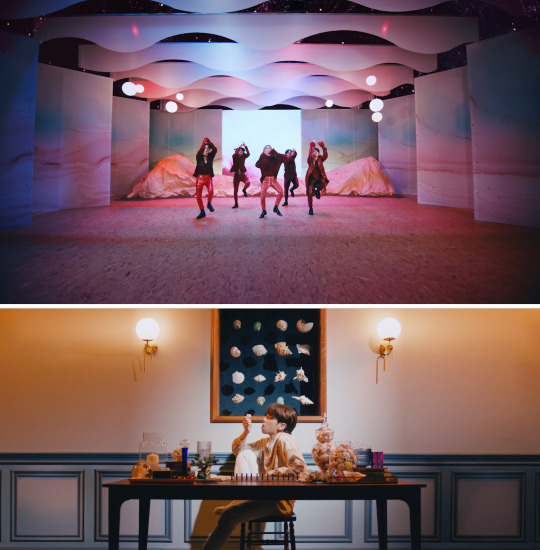
the locations have a bit of an obtuse arc, but it's there when you look for it. it starts interior spaces, where the ideas of sublime attempted to be recreated for the viewer. then it moves to transitory spaces; portions of nature isolated from a whole environment, interjections of human architecture into natural spaces:
(the white hut structure in the greenhouse is reminiscent of a skene (literally hut/tent), which is the structure at the back of the stage in ancient greek theatre used for the actors to change their masks and costumes. it was originally temporary, but slowly transformed into permanent stage architecture)

and then finally outdoors, into the sublime itself:
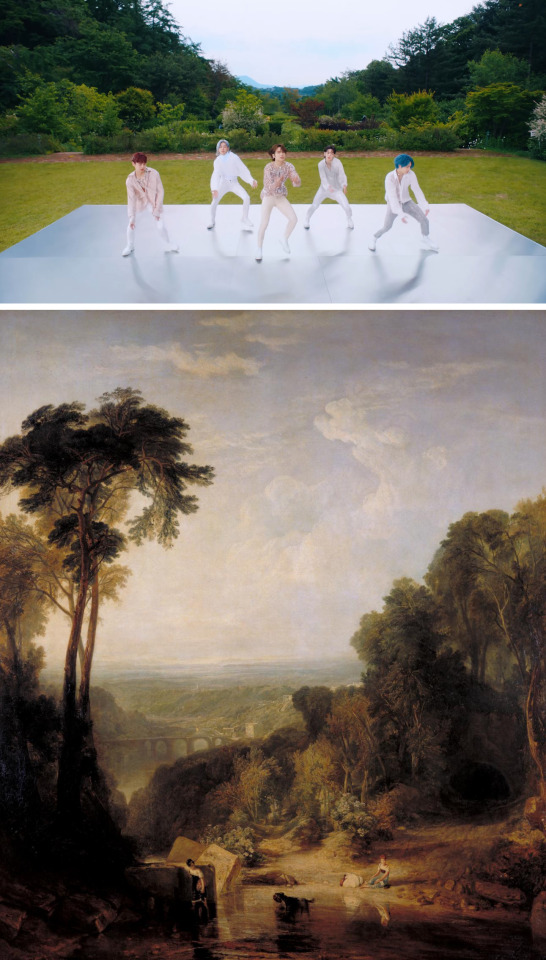
jwm turner, crossing the bridge, 1815
lastly,
lighting
there's a very clear lighting pattern here, primarily in light and dark. the base colour story is fairly simple complementary pairs; there's a lot of purple/red and green, and blue and yellow/amber, with everything relatively on the same tonal level. there are deliberate interjections of heavily saturated red for specific effect. there are also, most notably, a 'dark' version of all the sets. obviously as a reference to the eclipse that we see in the mv and in the concept photo series, but also as a reference to that darker undercurrent of the sublime, the upsetting, the uncanny, and the terrifying:

And the bay was white with silent light/Till rising from the same/Full many shapes, that shadows were/In crimson colours came.
#a.c.e#ace w#kpop analysis#group analysis#me - a staunch defender of kpop as valid spectacle: actually this one is a melodrama its meant to hit different#this essay is otherwise known as the quickest and dirtiest history of romanticism ever#i really should have pointed out that when i say romantic i mean romantic with a capital r#that probably would clear up some confusion but i have an aesthetic to maintain do not @ me#this is potentially the most pretentious thing i have ever written i am so sorry if this makes no sense#some of these connections are so tenuous who let me have opinions on the internet#did i write this as an excuse to look at the percy shelley memorial because i am obsessed with it as a piece of art? maybe#anyways read tom stoppard's arcadia if you want to know more about that#you should read all this with the caveat that the sublime and romanticism need to be deconstructed through a postcolonialist lens#because these theories are super colonialist about 'unclaimed untameable natural spaces'#when in reality most natural spaces are specifically architected by indigenous peoples in order to preserve and coexist with the ecosystem#this is may be more obviously applicable to american subliminal painting than european but it still applies#since the british were notoriously good at fucking up every kind of expedition ever#because of their lack of respect for literally anything and everything#and their inability to listen to anyone other than another white british person#see: history of the northwest passage#im a bad theorist and not caught up so i didnt get that deep into it because counter to the wordcount#i am not trying to write another dissertation#this is not as well researched as it could be but also im not reading burke and kant again#also yes byron the shelleys and polidori did just bang out the foundations for all of science fiction and romantic vampire mythology#in like three days because the all got bored during a storm and want to try and 'outscare' each other#also by 1840 like every prominent romantic poet was dead either from their own stupidity or tuberculosis#with the exception of wordsworth that motherfucker started the movement and then outlived it#text
17 notes
·
View notes